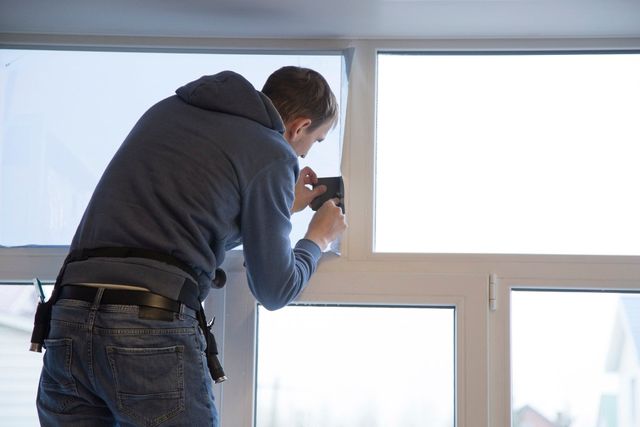Just How Residential Window Tinting Improves Your Home's Power Effectiveness
Residential window tinting provides a compelling remedy for homeowners seeking to enhance energy effectiveness within their living areas. By using specialized films to home windows, it efficiently minimizes warmth transfer, therefore maintaining indoor temperatures and decreasing the demand for excessive heating or cooling.
Understanding Window Tinting
Recognizing home window tinting is vital for property owners seeking to enhance both convenience and power efficiency in their home. Residential Window Tint. Home window tinting includes the application of a slim film to the interior or exterior surface of glass home windows. This film can considerably modulate the quantity of sunlight and warmth that enters a home, therefore affecting interior climate problems
There are different types of window tinting films available, each with distinctive homes. As an example, dyed movies take in solar power, while reflective films deflect it away from the glass surface. Ceramic movies offer an equilibrium of exposure and warm being rejected, making them a preferred option amongst home owners. The effectiveness of home window tinting is commonly gauged by its Visible Light Transmission (VLT) portion, which shows exactly how much light can pass through the film.
Benefits of Energy Effectiveness
Window tinting not only improves aesthetic appeals yet likewise plays a significant role in improving power efficiency within household areas. By minimizing heat transfer through windows, colored movies create a more steady interior environment, which can cause substantial decreases in energy intake for cooling and heating. This energy performance equates into lower utility costs, offering homeowners with substantial lasting cost savings.

Furthermore, home window tinting enhances the comfort of living areas. By lessening glow and obstructing unsafe UV rays, colored home windows develop an even more positive setting, which can bring about enhanced health for occupants. The defense against UV rays also helps protect furniture and flooring from fading, adding to the longevity of house items.
How Tinting Works
Tinting films operate with a combination of innovative products and technologies created to manage the quantity of solar power going into a home. Primarily made up of polyester, these films typically incorporate ceramic or metallic fragments that show and soak up warm. This double ability permits them to substantially minimize the penetration of ultraviolet (UV) rays and infrared radiation while permitting noticeable light to pass through.
The effectiveness of window tinting is gauged by its solar warm gain coefficient (SHGC), which suggests just how much solar energy is transmitted through the window. Reduced SHGC values are more effective as they represent better heat rejection. Furthermore, home window tints can feature a variety of shades, enabling homeowners to tailor their aesthetic choices while boosting energy performance.
In addition, these films act as an obstacle, protecting against warmth loss throughout cooler months by mirroring indoor warmth back right into the home. This thermal insulation impact enhances the air conditioning advantages gained throughout warmer months, adding to a balanced interior environment year-round. By managing solar energy efficiently, domestic window tinting not just improves convenience yet additionally plays a crucial duty in reducing power usage and lowering energy costs.
Selecting the Right Tint

There are numerous kinds of home window movies readily available, consisting of colored, metalized, and ceramic. Ceramic movies offer excellent heat control without jeopardizing visibility and are very resilient, making them a prominent choice.
Noticeable light transmission (VLT) is an additional important variable, as it indicates the quantity of all-natural light that can travel through the tinted glass. Home owners need to select a tint with a VLT that enhances their lights choices while still supplying sufficient glow decrease.
Additionally, assessing the solar warmth gain coefficient (SHGC) can help determine how well a color can block heat from sunshine. A reduced SHGC shows much better heat control, ultimately enhancing power performance.
Installment and Maintenance Tips
Correct setup and upkeep are vital parts in maximizing the benefits of domestic window tinting. To achieve ideal results, it is a good idea to employ a certified expert for installment. This makes certain that the tint is applied properly, staying clear of air bubbles, wrinkles, or misalignment that could compromise performance. Experts additionally use specialized tools and techniques, which can boost the longevity and performance of the color.
Adhering to setup, maintenance is important to lengthen the life of the window film. It is advised to wait at least 30 days prior to cleansing the tinted home windows to enable the glue to cure totally.
Furthermore, normal assessments are useful. Check for any peeling or bubbling, which can indicate incorrect installation or put on gradually - Residential Window Tint. Resolving these concerns immediately can advice protect against further damages and keep power effectiveness. By adhering to these setup and maintenance tips, property owners can ensure their home window tinting remains to supply substantial power financial savings and convenience for years to come.
Verdict
In verdict, residential window tinting serves as a reliable solution for improving energy efficiency within homes. By decreasing warmth transfer and obstructing dangerous UV rays, home window films add to lower energy usage and boosted interior convenience.
Window tinting includes the application of a try this site slim film to the interior or exterior surface of glass home windows. By decreasing heat transfer through windows, colored movies create a more steady interior environment, which can lead to significant decreases in power usage for home heating and air conditioning.The performance of window tinting is measured by its solar warmth gain coefficient (SHGC), which indicates just how much solar energy is transmitted via the home window. By handling solar energy successfully, residential window tinting not only enhances convenience however likewise plays a vital function in lowering energy intake and reducing utility expenses.
By lowering warm transfer and blocking dangerous UV rays, window films contribute to reduce power usage and boosted indoor comfort.